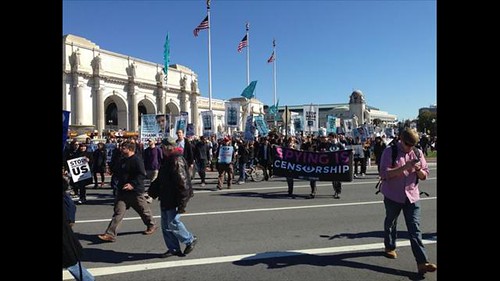
Thousands demonstrated against the National Security Agency and spying by the United States government in Washington, D.C. The event was held on Sat., October 26, 2013, a photo by Pan-African News Wire File Photos on Flickr.
December 22, 2013
Debating the N.S.A.’s Data Collection, and a Panel’s Findings
By EMMARIE HUETTEMAN
New York Times
Washington — A member of President Obama’s advisory committee on signals intelligence, the panel that recommended major restrictions on the National Security Agency’s data collection, on Sunday countered the notion that the panel had found no value in the agency’s activities.
Michael J. Morell, a former acting director of the Central Intelligence Agency, said that although the panel of independent experts did not find evidence that the National Security Agency’s efforts had helped stop a terrorist attack, the ability to monitor whether foreign terrorists were calling Americans remained important. The panel released its report on Wednesday.
Among its 46 recommendations to Mr. Obama, the panel suggested that a third party, like the telephone companies or a private consortium, hold on to the logs of phone numbers and call durations gathered by the agency. Officials would then have to obtain a court order each time they wanted to access such information.
Such a change would be the first significant restriction on the agency’s surveillance powers since 9/11. Mr. Morell said on the CBS program “Face the Nation” that it would add just a few days to the process of obtaining that data, with emergency exceptions.
“We think that better protects privacy and civil liberties while at the same time allowing the government to do what it needs to do to protect the country,” he said.
On Sunday’s talk shows, the debate continued over the panel’s recommendation that the government no longer maintain control over the call logs. The Obama administration on Friday argued that a federal case ruling on the constitutionality of warrantless surveillance programs would imperil state secrets.
Emphasizing that the panel had uncovered no evidence of abuse within the agency, Representative Mike Rogers, the Michigan Republican who heads the House Intelligence Committee, said on Sunday that the discussion over control of the information was worthwhile, but that he was not sure whether he agreed with the recommendation.
“I’m reluctant, because I think it opens up to more privacy violations when the companies hold it,” Mr. Rogers said on the ABC program “This Week.” “They don’t have somebody directly controlling that information. That’s not their job.”
But Senator Patrick J. Leahy, Democrat of Vermont, expressed his own reservations about the agency’s ability to protect that information.
“They did such a poor job at N.S.A. that a subcontractor was able to steal all those secrets, and today, after spending millions of dollars, they still don’t know what was stolen,” Mr. Leahy said on the NBC program “Meet the Press” of Edward J. Snowden, who leaked documents revealing the extent of the agency’s surveillance efforts.
Senator Mark Udall, Democrat of Colorado and a member of the Senate Intelligence Committee who has been a vocal critic of the agency’s surveillance efforts, said on “This Week” that he supported giving the data to a third party.
“There has been no abuse, but the potential for abuse is always there, and Americans have always erred on the side of protecting our privacy,” Mr. Udall said.
Representative Peter T. King, Republican of New York and a member of the House Homeland Security Committee, vigorously defended the National Security Agency’s surveillance efforts, saying on NBC that if the program had existed early enough, the Sept. 11 attacks could have been thwarted. He questioned why the agency’s activities were even up for discussion.
“This is all, to me, a debate generated by the hysteria caused by Edward Snowden, and why we’re listening to him is beyond me,” Mr. King said.
No comments:
Post a Comment